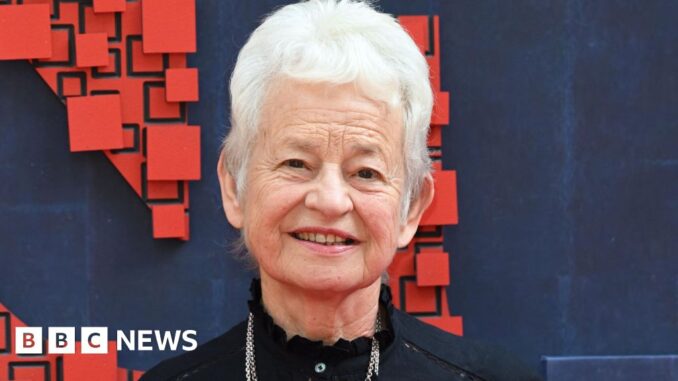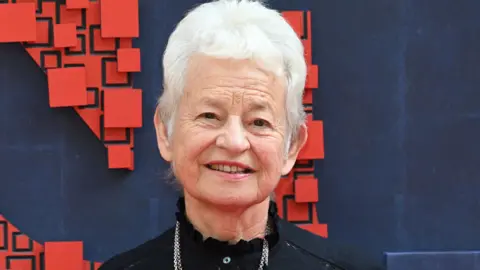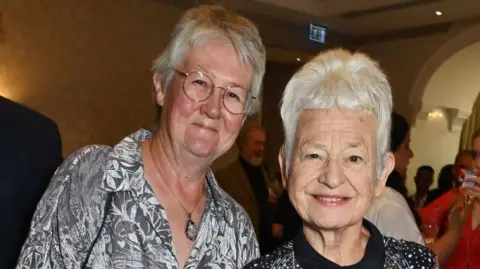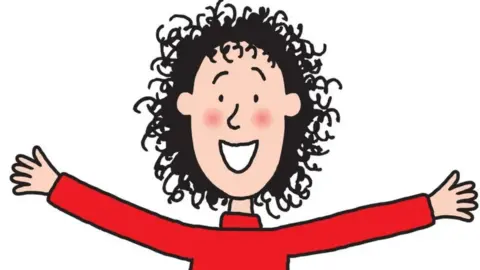
 Getty Images
Getty ImagesJacqueline Wilson has been described as many things over the years, but one title that still surprises her is “gay icon”.
In 2020, the British children’s writer announced that she was in a long-term relationship with a woman.
The beloved author, who is known for her nuanced depictions of childhood struggles, has found a new and unexpected audience after opening up about her sexuality.
“I’m very touched to be thought of as a gay icon, it’s an absolute delight,” she tells the BBC.
Aged 78, she can’t quite see herself “rampaging around with a rainbow flag, but I highly applaud and approve of anyone who does”.
Wilson has just published her first adult novel which, among other themes, explores same-sex relationships.
Think Again is the sequel to the Girls series and follows the life of Ellie Allard, and her best friends Nadine and Magda, as she turns 40.
Wilson says the idea “has been on my mind for years and started when my daughter asked me if I ever wonder what happens to my characters when they grow up”.
Having written more than 100 books, Wilson says now felt like the right time to write her first adult novel.
“In real time the girls would be hitting 40,” she reflects, “and that’s a significant age where you have to make big decisions, and, for some people, life doesn’t look like what you dreamt of as a teenager”.
‘No happy ever after ending’
In the book, none of the three women has quite the life they hoped for and Ellie is stuck in a rut as she reaches her milestone birthday.
“The girls don’t have their happy-ever-after ending but I didn’t want to write something that is all grim because there are things in their lives that are great and fun,” explains Wilson. “I just wanted it to be realistic.”
“Nowadays many teenagers are quite depressed and anxious, but they also have big ideas and say, ‘I want to be this’ or ‘I’m going to do that’, which is fantastic but this story shows that you need to have a plan B or C.”
The former children’s laureate is also using the book as a way to highlight how “choice is the best thing in modern life”.
Ellie, Magda and Nadine aren’t in relationships that society would expect from middle-aged women.
“There’s not just one path nowadays,” Wilson says. “In my generation we were told you either get married and have children or have a career but why can’t you do both?
“Getting married young wasn’t a sensible idea for me and women now are more sensible and work out what they want. It’s finding it that’s the difficult part!”
 Getty Images
Getty ImagesWilson’s books have explored all manner of themes, but it’s only recently she’s started writing about LGBT issues with her gay heroine appearing in her 2020 novel, Love Frankie.
She says that she could have written a gay character in her earlier work but “there would have been far more ‘oh my gosh Jacqueline has written about someone who is gay’ whereas now it’s not a big deal”.
In Think Again, Ellie finds herself unexpectedly falling in love with a woman, much like Jacqueline’s own life as she began a relationship with a woman after a divorce with her husband.
“I’m aware that people will think that there are parallels but that’s not the intention, I was just being imaginative when I wrote the book,” she says.
She also doesn’t think that society should view sexuality in such a binary way.
“We don’t need to just think that everyone is either straight or gay. Of course I’m not suggesting we chop and change all the time, but for my generation it didn’t occur that you could be attracted to all sorts of people, so we’ve definitely become much more grown up.”
 Penguin Books
Penguin BooksWilson, who was made a dame in 2008, has never shied away from writing about difficult and dark issues.
Most of her books, some of which explore suicide, mental health and domestic violence, are aimed at children aged between seven and 12.
As a result, her storylines have often caused controversy, but Wilson defends them.
“People say there is sex and drugs in my books, but there isn’t any,” she says, adding that her stories come from the fact she “wants to show what life is like for children who are a bit outside the system and feel they don’t belong and are unhappy for some reason”.
She says these stories “would be comforting for those children, but also help all the other kids understand why these kids might be a little bit difficult or whatever”.
While the characters in Think Again haven’t been influenced by Wilson’s own life, some of her earlier characters go through similar things she did as a child.
“‘I didn’t have that happy a life as a child – I was brought up on a council estate and I did used to think that the children in books were nothing like me and my friends.
“Parents never seemed to have any ugly rows in children’s books, which in my experience, they certainly did.”
Wilson also says she promised herself as a child that she would write about these issues if she ever got a chance.
“When I was 12 I wrote in a diary that if I ever wrote children’s books I would put all that in because I thought it’s very much part of life.”



Be the first to comment